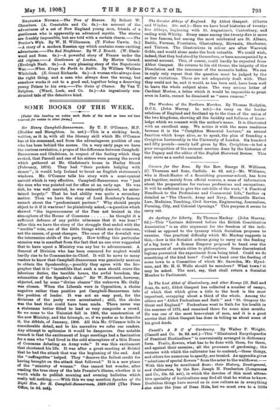SOME BOOKS OF THE WEEK.
[Under this heading we notice such Books of the week as have not been reserved for review in other forms.] Sir Henry Campbell-Bannerman. By T. P. O'Connor, M.P. (Hodder and Stoughton. 1s. net.)—This is a striking book, written, as it is, with all the literary skill which Mr. O'Connor has at his command, and from the advantageous position of one who has been behind the scenes. On a very early page we have the curious revelation, d propos of the difference between Campbell- Bannerman and Gladstone, in respect of the feeling which they evoked, that Parnell and one of his sisters were among the crowd which gathered at Mr. Gladstone's house in Harley Street (February, 1874). They had "their pockets bulging with stones"; it would help Ireland to break an English statesman's windows. Mr. O'Connor tells his story with a semi-cynical naïveté which is very effective. Campbell-Bannerman was " just the man who was pointed out for office at an early age. He was rich, he was well married, he was eminently discreet, he enter- tained largely." That he had ability was quite a secondary matter. Then we have the story of Lord Rosebery's famous remark about the "predominant partner." Why should people object to it if it was true ? he plaintively asked,—a question which showed " the ingenuousness of the Peer not trained in the atmosphere of the House of Commons he thought it a sufficient defence of any public utterance that it was true!" After this we have the story of the struggle that ended with the "cordite" vote, one of the little things which are the occasions, not the causes, of great changes. The cause of the downfall was the internecine strife of the party. How trifling this particular occasion was is manifest from the fact that no one ever suggested that to have upset a Ministry was any bar to advancement. A General of Division who has been censured for neglect would hardly rise to be Commander-in-Chief. It will be news to many readers to know that Campbell-Bannerman was genuinely anxious to obtain the Speakership,—possibly they agree with the bio- grapher that it is "incredible that such a man should crave the laborious duties, the terrible hours, the awful boredom, the solemnities of the Speaker's chair." Sir W. Harcourt, however, objected, and by some "divine chance" the unknown Mr. Gully was chosen. When the Liberals were in Opposition, a choice negative rather than positive put Campbell-Bannerman into the position of leader. It was not an easy post, for the divisions of the party were accentuated ; still, the choice was the best that could have been made. There never was a statesman better fitted to lead so very composite a crowd.. So we come to the Unionist fall in 1905, the construction of the new Ministry, and the triumph, or, if we prefer so to describe it, the dibticle, of January, 1906. All this Mr. O'Connor tells in considerable detail, and to his narrative we refer our readers. Any attempt to epitomise it would be dangerous. One notable remark is that the excitement of huge meetings had a fascination for a man who "had lived in the cold atmosphere of a thin House of Commons debating an Army vote." It was this excitement that shortened. his life. It was after a great meeting at Bristol that he had the attack that was the beginning of the end. And the "suffragettes " helped. They "deserve the fullest credit for having brought on the attack that followed." It is a new phase of the "ministry of woman." One cannot but wonder, after reading the true story of the late Premier's illness, whether it is worth while to publish morning and evening bulletins which really tell nothing.—With this we may mention Speeches of the Right Hon. Sir H. Campbell-Bannerman, 1899-1908 (The Times Office, ls. 6d. net). The Greater Abbeys of England. By Abbot Gasquet. (Chatto and ‘Viudus. 20s. net.)—Here we have brief histories of twenty- five Abbeys, beginning with St. Augustine's, Canterbury, and ending with Whitby. Every name among the twenty-five is more or less famous, but among the most celebrated are St. Albans, Battle, Furness, Fountains, Glastonbury, Rievaula, Sherborne, and Tintern. The illustrations in colour are after Warwick Goble, and would alone make the book valuable. We could wish, indeed, that they had stood by themselves, or been accompanied by a neutral account. This, of course, could hardly be expected from Abbot Gasquet. He returns to his old theme, the iniquity of the Dissolution and the innocence of the monastic bodies. We can in reply only repeat that the question must be judged by the earlier visitations. These are not adequately dealt with. That they could not be, and it would, as has been said, have been well to leave the whole subject alone. The very serious letter of Cardinal Morton, a letter which it would be impossible to print even in Latin, cannot be dismissed as "mere rumour."














































 Previous page
Previous page